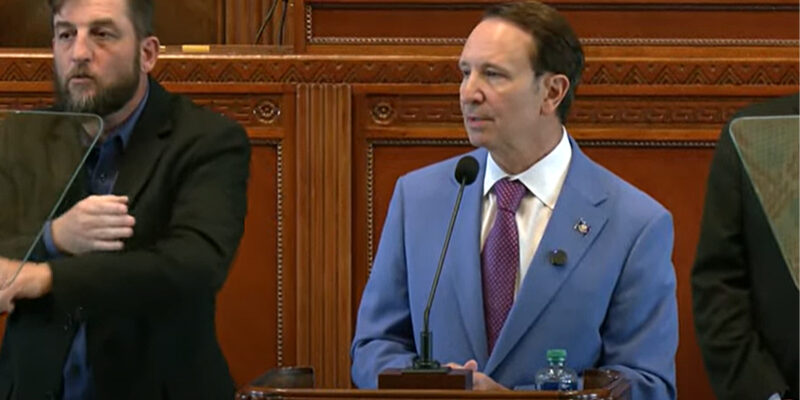We don’t have to do a big thing on this, because it’s a pretty cut-and-dried thing no matter how badly it triggers some people. But Gov. Jeff Landry posted on X that there is no such thing in our Constitution as “separation” of church and state, and that was like kicking over an anthill.
Louisiana was the first state to mandate the Ten Commandments in public school classrooms. @JoeRogan, how about you have me on to explain why State Representative Talarico is dead wrong.
God is the foundation of our great country, and the separation of church and state is a… pic.twitter.com/afioXydEXg
— Governor Jeff Landry (@LAGovJeffLandry) July 21, 2025
Click on the link to that X post and scroll down, and the people with the Ukraine and rainbow flags next to their names are saying the worst things imaginable about Landry.
But he’s correct.
The doctrine of “separation of church and state” is a modern interpretation of the First Amendment, and all the First Amendment says is that Congress is not allowed to establish an official government religion, nor impede the practice of faith among the people.
It actually doesn’t stop the states from establishing official religions, though. In fact, the states were formed, in many cases, out of colonies established by practitioners of varying faiths. Maryland was for Catholics, for example, Pennsylvania was founded by Quakers, and so on.
With the 14th Amendment, the Bill of Rights was extended to apply to state policies for the express purpose of insuring that Southern states not deny the rights of citizenship to newly freed slaves. But it was sloppily written, and out of the confusion its bad drafting caused, space was made for the progressive Left to codify cultural aggressions particularly in the 20th century.
Birthright citizenship being an example. At no point was it ever contemplated by the drafters of the 14th Amendment to include the children of illegal aliens as citizens. In fact, the phrase “subject to the jurisdiction thereof” in the language of that amendment was meant to exclude the children of foreigners not owing allegiance to the United States of America from U.S. citizenship, but because it wasn’t clear language it was ignored.
And the lack of clarity on extending the First Amendment’s Establishment Clause to the states in the 14th Amendment has created a situation in which atheists and anti-Christian elements have denied the majority will within states to promote a relatively universally-recognized Judeo-Christian moral code based on a false interpretation of the Establishment Clause.
That somehow a prohibition on a national establishment of faith – which, as written in the First Amendment is talking about whether we would declare ourselves Unitarians or Methodists or Mormons or some other denomination as our official Church of America, not whether we govern ourselves according to Judeo-Christian moral principles – now prevents a state from promoting the most basic manifestations of the moral code that has underpinned all of Western Civilization for well more than two millennia.
It’s an absurd proposition.
There can be an argument made that because the Constitution prevents Congress from declaring the whole country is Catholic, that effectively creates a separation of church and state. But that is not the argument being presented and it isn’t the argument Landry is refuting. Instead, the argument is that religion, and particularly the Judeo-Christian religious universe, has no place in American public life.
And that is wrong.
It has zero basis in history or law.
Landry is correct to note this. He’s also correct that Louisiana has the right to put up Ten Commandments posters in school classrooms, regardless of the jurisprudence to the contrary so far. We’ll see what the Supreme Court ultimately does with that state law which is winding its way through the courts.
But “myth” is a good word to use. He should be supported for saying it.
Advertisement
Advertisement

